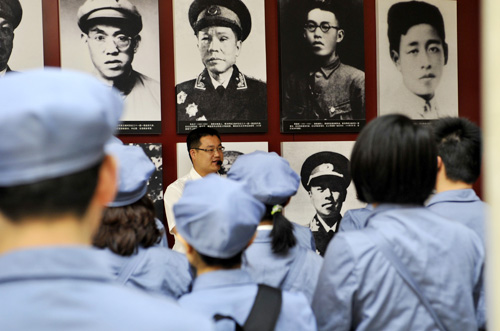|
 |
|
REVIEWING HISTORY: Trainees at China Executive Leadership Academy Jinggangshan visit an exhibition on revolutionary history in Jinggangshan in Jiangxi Province on May 10, 2011 (QIAN YI) |
The Communist Party of China (CPC) has always attached great importance to training cadres.
"After the founding of the People's Republic of China, China was very poor, and wanted to modernize. CPC cadres needed to learn things they did not understand before," said Yang Jiamu, associate counsel of the cadre Education Bureau under the Organization Department of the Central Committee of the CPC. "Since the implementation of the reform and opening-up policy in the late 1970s, cadres have been confronted with new situations and tasks, and they need to continue to study in order to master the modern rules and meet new challenges."
On December 18, 2002, at a national meeting on the organization work of the CPC, Hu Jintao, General Secretary of CPC Central Committee and President of China, said that all CPC members should "study, study and study again."
On December 27, 2002, members of the Political Bureau of the 16th Central Committee of the CPC engaged in the first group study. Hu said that group study should be made a routine to stick to for the long term.
As of the end of May 2012, the Political Bureau of the 16th and 17th central committees of the CPC had engaged in 77 sessions of group study, and more than 100 top experts and scholars had taught at Zhongnanhai, the offices of top CPC and government leaders. The courses covered major issues in economics, politics, law, culture, society, international affairs, military and Party construction.
Nowadays, almost all local CPC committees have organized such group studies. "Educating cadres is a pioneering, basic and strategic project to build a high-caliber cadre force, an important way to enhance the CPC's governing ability, and a major guarantee to push forward scientific development and promote social harmony," said Yang.
In 2007, the 17th National Congress of the CPC called for a continuation of large-scale cadre training.
Yang said that cadre training is important and pressing. He believes China is facing a new international situation and challenges in domestic economic and social development, and the most effective way to address the new situation is to step up cadre training so as to enrich their knowledge and enhance their abilities.
New explorations
The CPC's cadre training at the national level are primarily delivered by six facilities including the Party School of the CPC Central Committee and the Chinese Academy of Governance in Beijing, three executive leadership academies respectively in Pudong District in Shanghai, Yan'an in Shaanxi Province, and Jinggangshan in Jiangxi Province, and China Business Executives Academy Dalian in Liaoning Province.
Founded in 1933, the Party School of the CPC Central Committee is the Party's top training institution. Currently, Xi Jinping, Vice President of China and member of the Standing Committee of the Political Bureau of the CPC Central Committee, serves as the school's president.
Provincial and ministerial-level officials usually undergo two months of training in political science, public management, economics and history. Young and middle-aged officials spend six months to a year at the school.
Since 1981, the school has also offered postgraduate and doctoral programs to non-cadre students. These programs focus on philosophy, economics, law, politics and the history of the CPC.
The three executive leadership academies were established in 2005 in response to a call for large-scale cadre training made after the 16th National Congress of the CPC in 2002. One year later, China Business Executives Academy Dalian was set up.
Each of these training institutions has its own focuses. The two in Beijing specialize in Party construction and governance capability. The institute in Pudong emphasizes innovation in reform, international affairs, human resources management and leadership methods. The academies in Jinggangshan and Yan'an, two revolutionary bases, focus on CPC revolutionary history and the national situation. The academy in Dalian mainly trains business executives in large state-owned enterprises.
Trainees to national CPC training facilities usually come from national Party organs, state-owned enterprises and public organizations. Since the 16th National Congress of the CPC in 2002, business executives have been admitted into these training facilities.
| 